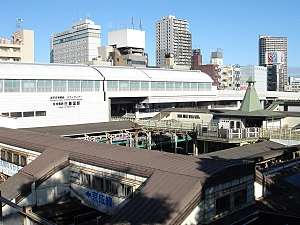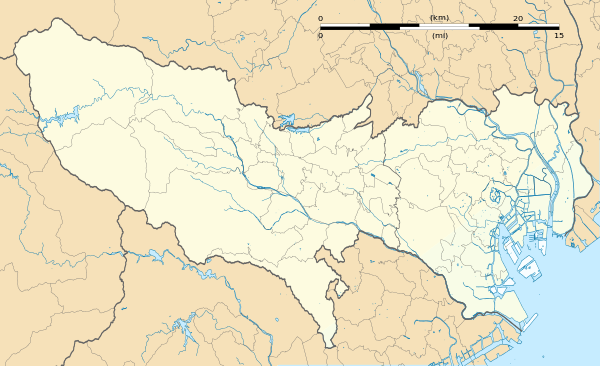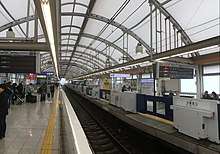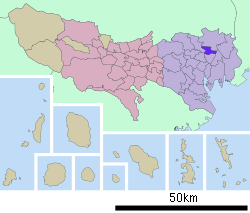Nippori Station
Nippori Station (日暮里駅, Nippori-eki) is a major railway interchange station in Arakawa, Tokyo, Japan.
NPRJY07JK32 JJ02 KS02 NT01 Nippori Station 日暮里駅 | |||||||||||||||||||||||||||||||||||||||
|---|---|---|---|---|---|---|---|---|---|---|---|---|---|---|---|---|---|---|---|---|---|---|---|---|---|---|---|---|---|---|---|---|---|---|---|---|---|---|---|
 Elevated view of Nippori station in September 2009 | |||||||||||||||||||||||||||||||||||||||
| Location | 2 Nishi-Nippori, Arakawa-ku, Tokyo Japan | ||||||||||||||||||||||||||||||||||||||
| Operated by |
| ||||||||||||||||||||||||||||||||||||||
| Line(s) |
| ||||||||||||||||||||||||||||||||||||||
| Connections | Bus terminal | ||||||||||||||||||||||||||||||||||||||
| Other information | |||||||||||||||||||||||||||||||||||||||
| Station code |
| ||||||||||||||||||||||||||||||||||||||
| History | |||||||||||||||||||||||||||||||||||||||
| Opened | 1905 | ||||||||||||||||||||||||||||||||||||||
| Traffic | |||||||||||||||||||||||||||||||||||||||
| Passengers (JR East, FY2013) | 102,817 daily | ||||||||||||||||||||||||||||||||||||||
| Services | |||||||||||||||||||||||||||||||||||||||
| |||||||||||||||||||||||||||||||||||||||
| |||||||||||||||||||||||||||||||||||||||
| Location | |||||||||||||||||||||||||||||||||||||||
 Nippori Station Location within Special wards of Tokyo  Nippori Station Nippori Station (Tokyo)  Nippori Station Nippori Station (Japan) | |||||||||||||||||||||||||||||||||||||||
Lines
- East Japan Railway Company (JR East)
- Joban Line (Rapid)
- Keihin-Tohoku Line
- Yamanote Line
- Keisei Electric Railway
- Toei
The station is an intersection of JR and Keisei systems. Although Keisei Ueno Station, the terminal of Keisei, is also located adjacent to JR East's Ueno Station, Nippori Station provides easier transfer.
Platforms
Keisei platforms

A new elevated platform serving outbound Keisei trains opened to traffic on October 3, 2009. The new elevated line has two side platforms serving a single track. One platform is for Skyliner, Cityliner, and Eveningliner boarding, while the other platform is for regular commuter trains. Ueno-bound trains continue to discharge on the original platform on the lower level.
| 0 | KS Keisei Main Line | for Keisei Ueno |
| 1 | KS Keisei Main Line | for Narita Airport (Terminal 2·3 and Terminal 1) via KS Narita Sky Access Line (Skyliner trains) |
| for Keisei Funabashi, Keisei Narita and Narita Airport via KS Keisei Main Line (Eveningliner trains) | ||
| 2 | KS Keisei Main Line | for Aoto, Shin-Kamagaya and Narita Airport via KS Narita Sky Access Line (Access Express trains) |
| for Aoto, Keisei Funabashi, Keisei Narita and Narita Airport via KS Keisei Main Line (Local, Rapid, Commuter Express and Limited Express trains) |
JR platforms
There are no platforms for tracks 5 to 8, which are for non-stop Takasaki Line and Utsunomiya Line trains.
| 3 | JJ Jōban Line (Rapid) | for Ueno JU Ueno-Tokyo Line for Tokyo and Shinagawa |
| 4 | for Kita-Senju, Toride, Tsuchiura and Narita | |
| 9 | JK Keihin-Tōhoku Line | for Ueno, Tokyo, Shinagawa and Yokohama |
| 10 | JY Yamanote Line (clockwise) | for Ueno and Tokyo |
| 11 | JY Yamanote Line (anti-clockwise) | for Ikebukuro and Shinjuku |
| 12 | JK Keihin-Tōhoku Line | for Tabata, Akabane and Ōmiya |
Nippori-Toneri platforms
The Nippori-Toneri Liner station is elevated and consists of a single island platform serving two tracks.
History
The JR station first opened on April 1, 1905.[1] The Keisei station opened on December 19, 1931.[2]
A new elevated platform for Keisei services opened on October 3, 2009.
Passenger statistics
In fiscal 2013, the JR East station was used by an average of 102,817 passengers daily (boarding passengers only), making it the 37th-busiest station operated by JR East.[3] In fiscal 2013, the Keisei station was used by an average of 96,428 passengers per day (exiting and entering passengers), making it the third-busiest station operated by Keisei.[4] Over the same fiscal year, the Toei station was used by an average of 20,421 per day (boarding passengers only), making it the busiest station on the Nippori-Toneri Liner.[5] The daily average passenger figures (boarding passengers only) for the JR East station in previous years are as shown below.
| Fiscal year | Daily average |
|---|---|
| 2000 | 77,469[6] |
| 2005 | 78,921[7] |
| 2010 | 96,633[8] |
| 2011 | 96,747[9] |
| 2012 | 99,875[10] |
| 2013 | 102,817[3] |
Surrounding area
- Yanaka Cemetery
- Yanaka-Ginza Shopping District
- Yūyake-dandan Stairs
- Fujimizaka Hill
- Tokyo Women's Medical University Medical Center East
Connecting bus services
Toei Bus operates local bus services from the following Nippori Station bus stops.
| Stop No. | Japanese | Reading | For |
|---|---|---|---|
| 1[11] | 里22 | Sato 22 | Kameido Station |
| 2[11] | 都08 | To 08 | Kinshichō Station |
| 3[11] | 里48 | Sato 48 | Minumadai-shinsuikoen Station |
| 里48-2 | Sato 48-2 | Kaga Danchi |
See also
References
- "JR East station information" (in Japanese). Japan: East Japan Railway Company. Archived from the original on 2011-05-18. Retrieved 3 May 2011.
- Terada, Hirokazu (July 2002). データブック日本の私鉄 [Databook: Japan's Private Railways]. Japan: Neko Publishing. p. 203. ISBN 4-87366-874-3.
- 各駅の乗車人員 (2013年度) [Station passenger figures (Fiscal 2013)] (in Japanese). Japan: East Japan Railway Company. Archived from the original on 2001-05-06. Retrieved 14 September 2014.
- 駅別乗降人員 [Passenger statistics for each station] (in Japanese). Keisei Electric Railway. Archived from the original on 2015-03-14. Retrieved 14 September 2014.
- 各駅乗降人員一覧 [Passenger statistics for each station] (in Japanese). Tokyo Metropolitan Bureau of Transportation. Archived from the original on 2014-10-04. Retrieved 14 September 2014.
- 各駅の乗車人員 (2000年度) [Station passenger figures (Fiscal 2000)] (in Japanese). Japan: East Japan Railway Company. Archived from the original on 2014-10-09. Retrieved 1 August 2013.
- 各駅の乗車人員 (2005年度) [Station passenger figures (Fiscal 2005)] (in Japanese). Japan: East Japan Railway Company. Archived from the original on 2014-10-09. Retrieved 1 August 2013.
- 各駅の乗車人員 (2010年度) [Station passenger figures (Fiscal 2010)] (in Japanese). Japan: East Japan Railway Company. Archived from the original on 2014-10-06. Retrieved 1 August 2013.
- 各駅の乗車人員 (2011年度) [Station passenger figures (Fiscal 2011)] (in Japanese). Japan: East Japan Railway Company. Archived from the original on 2014-10-08. Retrieved 1 August 2013.
- 各駅の乗車人員 (2012年度) [Station passenger figures (Fiscal 2012)] (in Japanese). Japan: East Japan Railway Company. Archived from the original on 2014-10-07. Retrieved 14 September 2014.
- 日暮里駅バスのりば 東京都交通局 [Nippori Station bus stops] (in Japanese). Japan: Tokyo Metropolitan Government. Retrieved 7 July 2018.
External links
| Wikimedia Commons has media related to Nippori Station. |
- JR East station information (in Japanese)
- Keisei Nippori Station diagram
